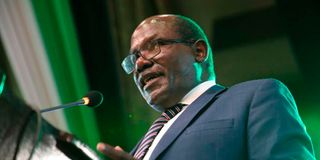Lawyer sues IEBC over degree requirement for MPs

IEBC Chairman Wafula Chebukati.
A city lawyer has sued the electoral commission for failing to disclose the applicable educational qualifications for parliamentary hopefuls.
Mr Adrian Kamotho Njenga wants the High Court to suspend implementation of an elections law that provides for university degree qualification as a precondition to nomination for election of an MP.
He says failure of the Independent Electoral and Boundaries Commission (IEBC) to make reference to the law that prescribes for a university degree in its various Gazette notices, issued in preparations for the August 9 General Election, has left parliamentary aspirants in a state of confusion.
“Curiously but significantly, the IEBC has completely avoided making any reference whatsoever to Section 22 of the Elections Act, 2011 in the various Gazette notices for election of MP. Thus, citizens have been left groping in the dark with regard to the issue of educational qualifications attached to the position MP,” says Mr Njenga in the court papers.
Due to the lingering confusion and lack of clarity by IEBC, the lawyer says there is danger that duly qualified aspirants may be illegitimately locked out.
He says it’s questionable why IEBC is not listing the educational qualification in its notices involving MP’s nomination, though it has directed political parties to submit party membership lists on or before April 9.
“There is great peril since it is not known what educational criteria the IEBC may eventually choose to rely on. Individuals and parties whose candidates will be deemed unqualified based on the IEBC’s secret educational standards will permanently loose out their right to contest during the August 9, 2022 election,” says Mr Njenga.
He wants the High Court to stop implementation and subsequently nullify the part of elections law that requires parliamentary aspirants to be holders of a university degree.
Mr Njenga says since Section 22(1)(b)(ii) of the Elections Act, which required civic candidates to have a degree, was declared unconstitutional by the High Court, the second part that refers to MPs is not sustainable and cannot be left standing.
The qualification in regard to MCAs was nullified on October 15 last year by Justice Anthony Mrima for being enacted without public participation.
Mr Njenga says Section 22(1)(b)(II) and (I), which required MCAs and MPs to have degrees, were enacted under the same circumstances and both should be nullified for lack of public participation.
“Having been enacted and assented to on the same occasion, under equivalent circumstances, and with similar defects to those Section 22 (1) (b) (II), which was declared unconstitutional, Section 22 (1) (b) (I) of the Elections Act, is by all means also unconstitutional for been enacted without public participation. It cannot be sustained,” he says.
He further argues that Parliament acted unreasonably and excessively when enacting the law by equating the educational qualifications for parliamentary hopefuls to those of gubernatorial and presidential aspirants, yet the roles are manifestly distinguishable.
“Implementation of Section 22 (1) (b) (I) of the Elections Act, 2011 in the proposed manner, will lock out many skilled, competent and divinely gifted leaders from exercising their constitutional right to vie, to be elected and to participate in the political affairs of the nation,” says Mr Njenga.
According to the Kenya National Bureau of Statistics, out of a total population of about 50 million people, only 1.3 million Kenyans hold university degrees, translating to less than two per cent.
Mr Njenga argues that the remaining proportion is not illiterate, but largely endowed with alternative skills and competencies, which are sufficient for a parliamentary role.
Among the 1.3 million Kenyans with university degrees, about 95 per cent are in formal employment, either in public service or the private sector.
That essentially means that citizens will be compelled to elect MPs from an extremely constricted pool of less than 10,000 candidates, thereby clogging the citizens’ right to political freedom of choice.
Mr Njenga says although the constitution mandates the National Assembly to legislate on educational qualifications for parliamentary hopefuls, it does not empower the House to impose a degree requirement and disregard all other tertiary qualifications.
The disregarded qualifications include diplomas, higher diplomas, professional certifications and continuous knowledge acquisition programmes.
“From a fiscal perspective, participation of multiple candidates in general elections is beneficial to national welfare since it accords wealthy and politically minded individuals to pump liquidity to the economy. This opportunity to spur the economy would be lost if the provisions of section 22 (1) (b) (I) of the Elections Act, 2011 were to remain in force,” says Mr Njenga.





